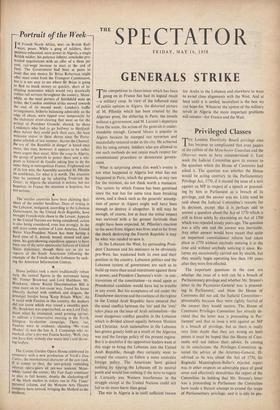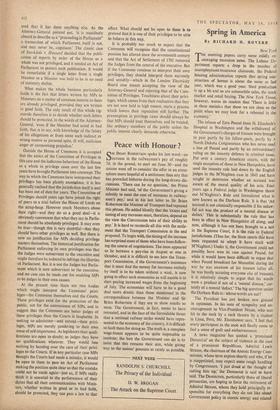Privileged Classes
THE London Electricity Board privilege case has become so complicated that even papers of the calibre of the Manchester Guardian and the Observer seem to have misunderstood it. Last week the Judicial Committee gave its answer to the question which the House of Commons had asked it. The question was whether the House would be acting contrary to the Parliamentary Privilege Act, 1770, if it treated the issue of a writ against an MP in respect of a speech or proceed- ing by him in Parliament as a breach of its privilege, and the answer was no. Little need be said about the Judicial Committee's reasons for its decision, except that it is perhaps odd to answer a question about the Act of 1770 which is , still in force solely by examining an Act of 1700 which was repealed ninety years ago. The question was a silly one and the answer was inevitable. Any other answer would have meant that quite an important constitutional reform had taken place in 1770 without anybody noticing it at the time and without anybody noticing it since. Re- forms are occasionally carried out by stealth, but they usually begin operating less than 190 years after they were first effected.
The important questions in the case are whether the issue of a writ can be a breach of Parliamentary privilege and whether Mr. Strauss's letter to the Paymaster-General was 'a proceed- ing in Parliament,' and these the House of Commons did not ask the Judicial Committee— presumably because they were rightly fearful of the answer they would receive. The House of Commons Privileges Committee has already de- cided that the letter was 'a proceeding in Par- liament' and that to issue a writ against an MP is a breach of privilege, but as there is really very little doubt that they are wrong on both points it must be hoped that the House of Corn- mods will not follow their advice. In coming to its conclusions the Privileges Committee ig- nored the advice of the Attorney-General. Ill- advised as he was about the Act of 1770, Sir Reginald Manningham-Buller's rejected report was in other respects an admirable piece of good sense and effectively demolishes the report of the Committee. In holding that Mr. Strauss's letter was a proceeding in Parliament the Committee have made a blatant attempt to extend the scope - of Parliamentary privilege, and it is idle„t6 pre- tend that it has done anything else. As the Attorney-General pointed out, 'it is manifestly absurd to describe as a "proceeding in Parliament" a transaction of which Parliament /itself is not, and may never be, cognisant.' The classic case of Stockdale v. Hansard decided that the publi- cation of reports by order of the House as a whole was not privileged, and it needed an Act of Parliament to protect such publication. It would be remarkable if a single letter from a single Member to a Minister was held to be in no need of statutory shelter.
What makes the whole business particularly futile is the fact that letters written by MPs to Ministers on a matter of common interest, to them are already privileged, provided they are written in good faith. The only result of this whole rig- marole therefore is to decide whether such letters should be protected, in the words of the Attorney- General, 'even if the Member had acted in bad faith, that is to say, with knowledge of the falsity of his allegations or from some such indirect or wrong motive as personal spite, ill will, malicious anger or unreasoning prejudice.'
Outside the House of Commons it is accepted that the antics of the Committee of Privileges in this case and the ludicrous behaviour of the House as a whole in privilege cases over the last few years have brought Parliament into contempt. The way in which the Commons have interpreted their privileges has been plainly anomalous; it is less generally realised that the jurisdiction itself is and has been out of date for years. The Committee of Privileges should years ago have joined the right of peers to a trial before the House of Lords on the scrap-heap. However much Members abuse their right—and they do so a good deal—it is obviously convenient that what they say in Parlia- ment should be absolutely privileged. It may even be true—though this is very doubtful—that they should have other privileges as well. But there is now no justification for MPs deciding privilege matters themselves. The historical justificatiOn for Parliament enforcing its own privileges was that the Judges were subservient to the executive and might therefore be induced to infringe the liberties of Parliament. But it is not the Judges but Parlia- ment which is now subservient to the executive, and no case can be made out for enabling MPs to be judges in their own causes.
At the present time there are two bodies which might interpret the Commons' privi- leges—the Commons themselves and the Courts. These privileges exist for the protection of the public, not for the convenience of MPs, and to suggest that the Commons are better judges of these privileges than the Courts is laughable. In seeking to- administer—and extend—their privi- leges, MPs are merely pandering to their own sense of self-importance. As legislators their quali- fications are open to doubt; as judges they have no qualifications whatever. They would lose nothing by handing over the care of their privi- leges to the Courts. If in any particular case MPs thought the Courts had made a mistake, it would be open to them to pass an Act of Parliament making the position quite clear so that the mistake could not be made again—just as, if MPs really think it is essential to the performance of their duties that all their communications with Minis- ters, whether written in good or in bad faith, should be protected, they can pass a law to that effect. What should not be open to them is to pretend that it is one of their privileges to be able to behave in this way.
It is probably too much to expect that the Commons will recognise that the constitutional position has altered since the seventeenth century and that the Act of Settlement of 1701 removed the Judges from the control of the executive. But if the Commons continue to interpret their own privileges, they should interpret them narrowly and sensibly—which in the London Electricity Board case means accepting the view of the Attorney-General and rejecting that of the Com- mittee of Privileges. Touchiness about their privi- leges, which comes from their realisation that they are not now held in high esteem, starts a process which lowers their reputation still further. The presumption in privilege cases should always be that MPs should treat themselves, and be treated, like ordinary members of the public unless the public interest clearly demands otherwise.



































 Previous page
Previous page